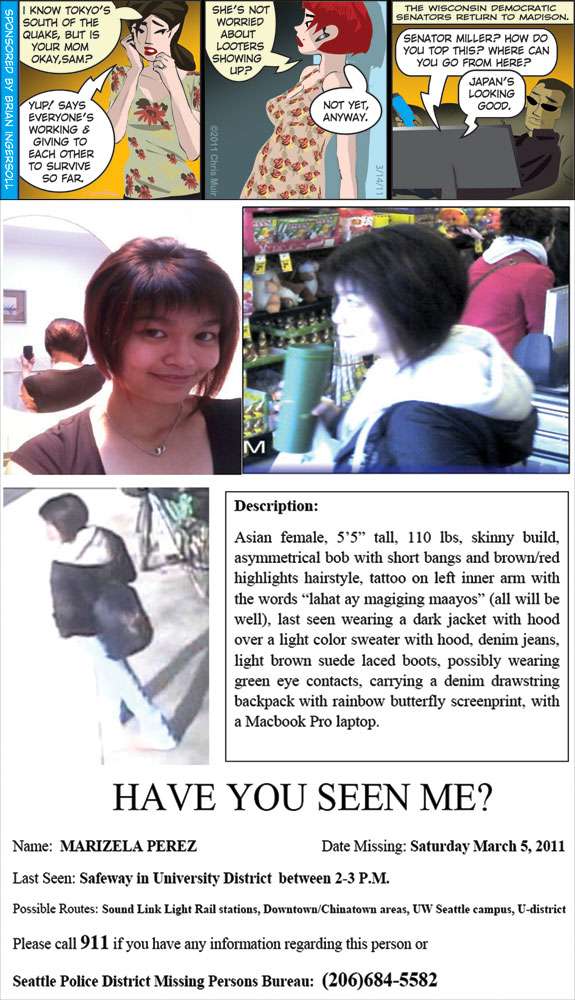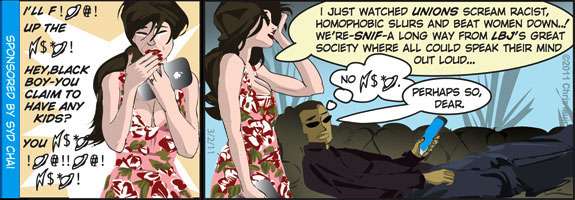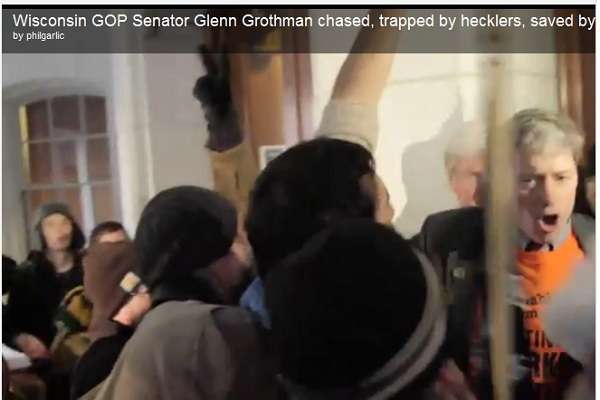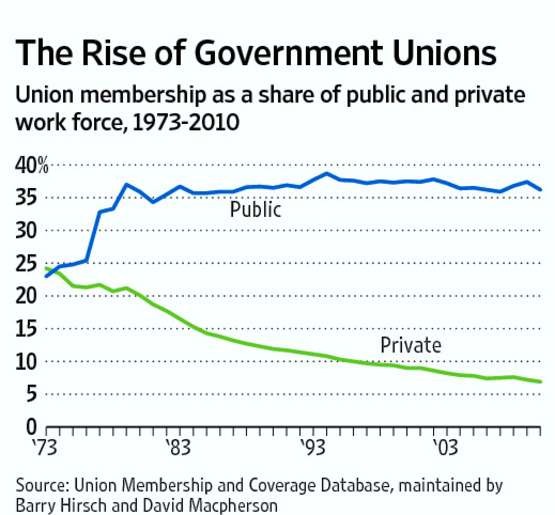-
Day By Day March 14, 2011 – Turning Japanese

Day by Day by Chris MuirJapan’s earthquake and resulting tsunami is a true disaster. The Wisconsin Democrats and their supporters on the Far Left are just ridiculous.Now, the Democrats and unions are promoting recalls of Republican Legislators who voted to support Wisconsin Governor Scott Walker’s budgetary reform plan. Are we now going to recall every Legislator if they vote a way that the unions don’t support? And, will the Democrats who know they will lose a specific vote, then just leave the state rather than suffer the loss?
A bad series of precedences are being set in Wisconsin.
Previous: -
Video: Wisconsin FLEEBAGGER Democrat State Senator Lena Taylor Finds Something to Rant About in Illinois
Ms. Lena Taylor, a fleebagger State Senator from Wisconsin, spends nearly three minutes of her time criticizing school choice on Obama’s old stomping grounds while acting like a total hypocrite by railing on Milwaukee Public Schools.Senator Taylor really should go back to Wisconsin and do the job Wisconsin voters elected her to do.
Good grief.
-
Update: Wisconsin Democrat Fleebaggers to End Union Standoff and Will Return to Vote – Not Until Collective Bargaining is Off the Table
+++++Update+++++Well, not so fast. The Wisconsin Fleebaggers aren’t coming back to Wisconsin after all.
Wisconsin State Senator Chris Larson: Sen. Miller’s comments are taken out of context in the Wall Street Journal article just released. Dems will return when collective bargaining is off the table. That could be soon based on the growing public opposition to the bill and the recall efforts against Republicans. Unfortunately, the WSJ fished for the quote they wanted, skipping this key step in logic: we won’t come back until worker’s rights are preserved.
Union solidarity rallies continue outside the Wisconsin Capitol as filmmaker Michael Moore tells the crowd that America is not broke, but that the elite controls the money.The Wisconsin Democrat State Senators who fled the state rather than vote on union legislation supported by the Wisconsin GOP and Republican Governor Scott Walker are ending their stand-off and will return to the Capitol.
Playing a game of political chicken, Democratic senators who fled Wisconsin to stymie restrictions on public-employee unions said Sunday they planned to come back from exile soon, betting that even though their return will allow the bill to pass, the curbs are so unpopular they’ll taint the state’s Republican governor and legislators.
The Wisconsin standoff, which drew thousands of demonstrators to occupy the capitol in Madison for days at a time, has come to highlight efforts in other states to address budget problems in part by limiting the powers and benefits accorded public-sector unions.
Sen. Mark Miller said he and his fellow Democrats intend to let the full Senate vote on Gov. Scott Walker’s “budget-repair” bill, which would also limit public unions’ collective bargaining rights. The bill, which had been blocked because the missing Democrats were needed for the Senate to have enough members present to consider the bill, is expected to pass the Republican-controlled chamber.
He said he thinks recent polls showing voter discontent with Mr. Walker over limits on bargaining rights have been “disastrous” for the governor and give Democrats more leverage to seek changes in a broader two-year budget bill Mr. Walker proposed Tuesday.
Andrew Welhouse, a spokesman for Republican Senate Majority Leader Scott Fitzgerald, said the short-term budget-repair bill can no longer be amended. He said when Democrats return they will be able to speak on the bill, “but we plan to pass it as soon as possible.”
Wisconsin has severe budget problems like a number of states. If Wisconsin voters don’t like what Governor Scott Walker and the GOP have done to balance things, then they can vote them out of office and reverse the union collective bargaining reforms at the next election.
Somehow, I don’t think that will happen.
-
Video: Wisconsin Democrat Fleebaggers to End Union Standoff and Will Return to Vote
Union solidarity rallies continue outside the Wisconsin Capitol as filmmaker Michael Moore tells the crowd that America is not broke, but that the elite controls the money.The Wisconsin Democrat State Senators who fled the state rather than vote on union legislation supported by the Wisconsin GOP and Republican Governor Scott Walker are ending their stand-off and will return to the Capitol.
Playing a game of political chicken, Democratic senators who fled Wisconsin to stymie restrictions on public-employee unions said Sunday they planned to come back from exile soon, betting that even though their return will allow the bill to pass, the curbs are so unpopular they’ll taint the state’s Republican governor and legislators.
The Wisconsin standoff, which drew thousands of demonstrators to occupy the capitol in Madison for days at a time, has come to highlight efforts in other states to address budget problems in part by limiting the powers and benefits accorded public-sector unions.
Sen. Mark Miller said he and his fellow Democrats intend to let the full Senate vote on Gov. Scott Walker’s “budget-repair” bill, which would also limit public unions’ collective bargaining rights. The bill, which had been blocked because the missing Democrats were needed for the Senate to have enough members present to consider the bill, is expected to pass the Republican-controlled chamber.
He said he thinks recent polls showing voter discontent with Mr. Walker over limits on bargaining rights have been “disastrous” for the governor and give Democrats more leverage to seek changes in a broader two-year budget bill Mr. Walker proposed Tuesday.
Andrew Welhouse, a spokesman for Republican Senate Majority Leader Scott Fitzgerald, said the short-term budget-repair bill can no longer be amended. He said when Democrats return they will be able to speak on the bill, “but we plan to pass it as soon as possible.”
Wisconsin has severe budget problems like a number of states. If Wisconsin voters don’t like what Governor Scott Walker and the GOP have done to balance things, then they can vote them out of office and reverse the union collective bargaining reforms at the next election.
Somehow, I don’t think that will happen.
-
Poll Watch: Wisconsin Governor Scott Walker Plunges in Job Approval Rating
This latest Rasmussen poll could possibly portend a compromise with the Wisconsin Democrat State Senators who remain out of the state in Illinois.
Wisconsin Governor Scott Walker won his job last November with 52% of the vote, but his popularity has slipped since then.
A new Rasmussen Reports telephone survey of Likely Wisconsin Voters finds that just 34% Strongly Approve of the job he is doing, while 48% Strongly Disapprove. Overall, including those who somewhat approve or disapprove, the new Republican governor earns positive reviews from 43% and negative reviews from 57% of voters statewide.
In addition to the usual partisan and demographic breakdowns, it’s interesting to note that Walker, now engaged in a budget battle with unionized state workers, receives a total approval rating of 46% from households with private sector union members. However, among households with a public sector union member, only 19% offer their approval. Among all other households in the state, opinion is nearly evenly divided—49% favorable and 51% unfavorable.
It’s also interesting to note that among households with children in the public school system, only 32% approve of the governor’s performance. Sixty-seven percent (67%) disapprove, including 54% who Strongly Disapprove.
This may be partly due to the fact that 77% of Wisconsin voters have a favorable opinion of the state’s public school teachers. However, only 50% have a favorable opinion of the teachers’ union.
The survey of 800 Likely Voters in Wisconsin was conducted on March 2, 2011 by Rasmussen Reports. The margin of sampling error is +/- 4 percentage points with a 95% level of confidence.
The fact remains voters do not like turmoil and the unions have created just that in Wisconsin. It is my belief that Walker should go “all in” and stay the course.
Walker will either win or lose but any half-way measure will spell certain defeat for him and his party.
-
Day By Day February 2, 2011 – Padding Speech
 Don’t you just love the Wisconsin protesters and all of the CIVILITY.
Don’t you just love the Wisconsin protesters and all of the CIVILITY.Look at this video clip where a Republican State Senator is chased, accosted by the protesters and is rescued by a Democrat Rep. Hulsey.
Click on the image to view.

Or Click the link here.In the meantime, the Wisconsin Democrat State Senators remain in Illinois as FLEEBAGGERS.
Previous: -
Why Wisconsin Governor Scott Walker MUST Stay the Course
Mickey Kaus makes the argument.
It’s all about the deficit to Brooks. But the damage done by public sector unionism isn’t mainly the producing of deficits. It’s the crippling of government, so that bad teachers can’t be fired and productivity stagnates and virtually everything the government does it does crappier than private industry does it. That’s a big, ongoing problem for Democrats, which is why maybe it doesn’t trouble Brooks. But it should trouble even non-neo liberals. Democrats are the party that needs the government to be good at something other than mailing out checks.
Is Gov. Walker using the deficit as an excuse for making long-term institutional changes? You bet. It’s “all or nothing” because when you threaten the core institutional basis of AFSCME and the SEIU they will make it all or nothing. They have no choice.
It would be a disaster for union reform if Walker succumbs to Brooksian flaccidity now–whether his position is popular or not. The message, as gleefully interpreted by the MSM, would be that Republicans go too far when they threaten the treasured institution of government unionism (never mind that Gov. Mitch Daniels of Indiana ended state employee union collective bargaining six years ago, by executive order, and he still stands). That would be worse than if Walker had never made the attempt. He has the votes and can pass the bill whatever the polls say–just as Obama had the votes on his health care bill despite poll-measured popular disquiet.
Obama pushed his law through, took the heat, and may emerge victorious. Walker should do the same.
-
Union Education: What Wisconsin Reveals About Public Workers and Political Power
 A great primer in the Wall Street Journal this morning.
A great primer in the Wall Street Journal this morning.The raucous Wisconsin debate over collective bargaining may be ugly at times, but it has been worth it for the splendid public education. For the first time in decades, Americans have been asked to look under the government hood at the causes of runaway spending. What they are discovering is the monopoly power of government unions that have long been on a collision course with taxpayers. Though it arrived in Madison first, this crack-up was inevitable.
We first started running the nearby chart on the trends in public and private union membership many years ago. It documents the great transformation in the American labor movement over the latter decades of the 20th century. A movement once led by workers in private trades and manufacturing evolved into one dominated by public workers at all levels of government but especially in the states and cities. (…)
The sharp rise in public union membership in the 1960s and 1970s coincides with the movement to give public unions collective bargaining rights. Wisconsin was the first state to provide those rights in 1959, other states followed, and California became the biggest convert in 1978 under Jerry Brown in his first stint as Governor. President Kennedy let some federal workers organize (though not collectively bargain) for the first time in 1962, a gambit to win union support for his re-election after his cliffhanger victory in 1960.
It’s important to understand how revolutionary this change was. For decades as the private union movement rose in power, even left-of-center politicians resisted collective bargaining for public unions. We’ve previously mentioned FDR and Fiorello La Guardia. But George Meany, the legendary AFL-CIO president during the Cold War, also opposed the right to bargain collectively with the government.
Why? Because unlike in the private economy, a public union has a natural monopoly over government services. An industrial union will fight for a greater share of corporate profits, but it also knows that a business must make profits or it will move or shut down. The union chief for teachers, transit workers or firemen knows that the city is not going to close the schools, buses or firehouses.
This monopoly power, in turn, gives public unions inordinate sway over elected officials. The money they collect from member dues helps to elect politicians who are then supposed to represent the taxpayers during the next round of collective bargaining. In effect union representatives sit on both sides of the bargaining table, with no one sitting in for taxpayers. In 2006 in New Jersey, this led to the preposterous episode in which Governor Jon Corzine addressed a Trenton rally of thousands of public workers and shouted, “We will fight for a fair contract.” He was promising to fight himself.
And, most taxpayers who are disengaged from the hardball of politics wonder why the schools, roads and other public services are not better? Their hard-earned tax money is being siphoned off and corruptly spent.
Events may be coming to a tipping point in Wisconsin this week, but will repeated across America as we head into election 2012. America can no longer afford this direct assault to its democratic republic.
-
LA Times Headline: “Protesters Out in Force Nationwide to Oppose Wisconsin’s Anti-Union Bill” – I Don’t Think So
This is what the LA Times Headline screams: “Protesters out in force nationwide to oppose Wisconsin’s anti-union bill.”
Promoters, such as David Dayen at Firedoglake, were predicting a million-person turnout nationwide. But reports as of 7:00 E.S.T. today make clear that other than in Madison, Wisconsin, the crowds were sparse.
The turnout in Madison was sizable, with estimates ranging over
from50-70,000, which included protesters bused in from other states. (Dayen is trying to pump the crowd estimate to over 100,000.) But elsewhere, the crowds numbered only in the hundreds or low thousands.In Washington, D.C., only about 500 people showed up (go to link for good photos of crazy signs). (Note, WaPo says 1000.)
In Columbus, OH, where you would expect a big crowd given a similar controversy, only “several thousand” people protested.
Other head counts, based on news reports, include: Boston (1000), Portsmouth, N.H. (few hundred), Augusta, ME (small crowd), New York City (“several thousand“), Chicago (1000), Miami (100), Austin (several hundred), Chicago (1000); Lansing, MI (2000), Nashville (hundreds), Los Angeles (2000), Richmond, VA (300), Denver (1000); Frankfurt, KY (several hundred), Jefferson City, MO (several hundred), Harrisburg, PA (several hundred).
While I don’t have a complete count, based on these numbers from some major cities and labor states, total protesters nationwide (excluding Madison) likely totaled under 100,000 combined.
Outside of Madison, there were no reports of sizable crowds. And if you read the news reports, almost all the protesters were other union members. Despite the efforts, the organizers failed to motivate significant numbers of non-union members to come out for protests.The 50-state protest was a failure, plain and simple, although the images from Madison may create the false impression of massive nationwide protests.
The subhead at the LA Times reads more accurately: “Up to 100,000 rally in Madison while hundreds show up in dozens of other cities to combat the Republican-backed measure that would limit collective bargaining rights for most public workers in Wisconsin.” But, the subheadline contradicts the headline because the protesters were not out in force NATIONWIDE.
This is NOT true.
But, there is MORE:
Nearly two weeks into a political standoff, tens of thousands rallied in Madison and in dozens of cities around the nation to oppose a bill that would severely limit collective bargaining rights for most Wisconsin public employees.
Joel DeSpain, spokesman for the Madison Police Department, said the rally — in steadily falling snow — drew between 70,000 and 100,000 and may have been the largest protest in Madison since the Vietnam War
Again, NOT true and implying that the protest crowds outside of Madison, Wisconsin were on the massive scale.
Later on in the piece they admit the protest crowd in Los Angeles was not so much:
Elsewhere, hundreds of boisterous pro-union demonstrators gathered on the steps of Los Angeles City Hall, loudly voicing their support for the Wisconsin workers while speaking of concerns that the perennially forceful labor movement in California could one day face a similar crisis.
“If it can happen in Wisconsin, it can happen anywhere,” said Pasquale Gazillo, a merchant marine, referring to Wisconsin’s long history as a union stronghold.
“States like that, they’re the ones that started the eight-hour workday and made sure workers got paid if they got sick. The Republicans are pushing, and if that state falls, the rest of the country is going to be in trouble,” he said.
Nice try at spin LA Times. Gotcha…..
-
Day by Day February 26, 2011 – Express

Day by Day by Chris MuirWisconsin Democrat Senators – The FLEEBAGGERS – really think Wisconsin voters are stupid, now don’t they?It is very simple as in Chris Muir’s cartoon: Wisconsin taxpayers pay taxes to hire teachers who are required by law to pay union dues, who fund Democrats, so they can increase taxes and hire MORE teachers and more union workers —–> more dues to the union.
It is a perverse, corrupt cycle – is there any wonder why organized labor has mounted massive protests to Saul Alinsky-ize the demise of their sweetheart deal in Wisconsin?
But, you see, folks, belonging to a public employee union which has full collective bargaining ability is a privilege granted by state legislatures, not a right, enshrined in the U.S. Constitution.
Wisconsin’s legislature will vote on the matter and then Governor Scott Walker can either sign or veto the measure. If voters don’t like it, then the next election they can replace their legislators and Governor.
End of story.
Previous:
The Day By Day Archive